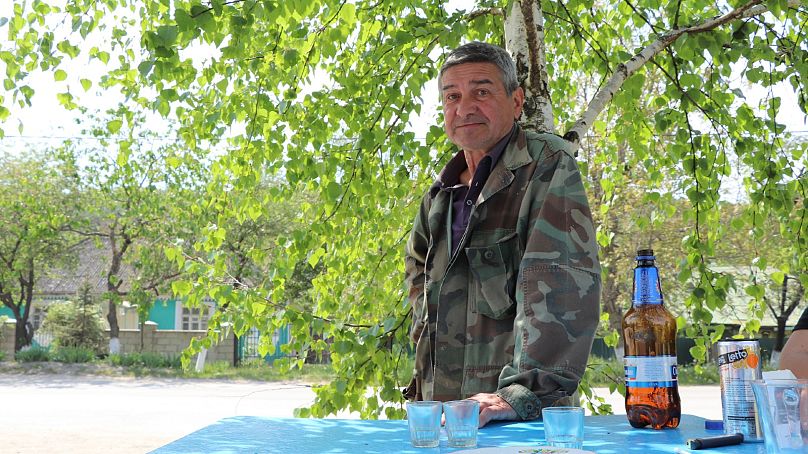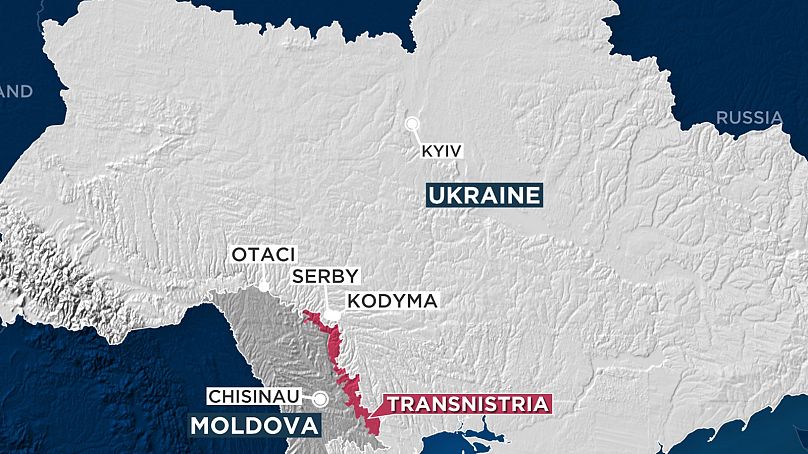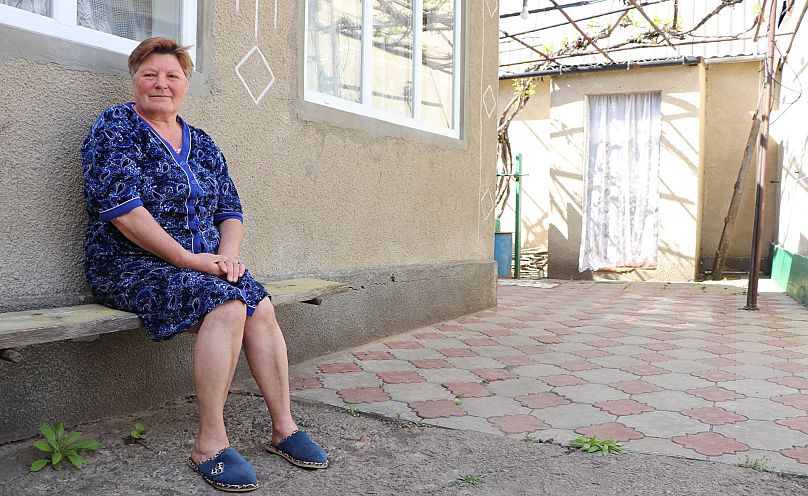“I don’t know where we would go if the Russian troops came here. There is nowhere to run.”
Yana stands in her pink flip-flops about 15 kilometres from the Moldova border. She is scared.
Like others in the towns and villages in this region, she is worried the focus of Russia's war in Ukraine will spread toward Transnistria.
Transnistria is a small pro-Russia breakaway region sandwiched between Ukraine and Moldova, both formerly part of the Soviet Union. It unilaterally declared itself independent in the early 1990s but is not recognised by any other country worldwide. Russia has a small contingent of 1,500 troops in the region it says are peacekeepers.
“We see more and more Ukrainian military here," said Lana, 30, who lives with her husband and two children in Serby. "They are here to protect us, and while they say that all will be okay, I know they are here for a reason. I am scared that [Russian President Vladimir] Putin might eventually come.”
It comes after a senior Russian commander Major General Rustam Minnekayev said in April that Moscow's objective was to take full control of southern Ukraine and the eastern Donbas region, giving it access to Crimea -- which it annexed from Ukraine in 2014 -- and Transnistria.
"Control over the south of Ukraine is another way out to Transnistria, where there are also facts of oppression of the Russian-speaking population," said Maj Gen Minnekayev.
Ukraine sees Russian claims that people in Transnistria are oppressed as a Russian attempt to justify an intervention into Moldova.
Yana, meanwhile, told Euronews she doesn’t know what to do at this point.
She might want to evacuate if things worsen but she also knows that all she owns is the family's house and doesn’t want to leave that.
“I never thought that it could be dangerous to live here. We always had a quiet relationship with Pridnestrovie (the other name for Transnistria),” she said. “I don’t know where we would go if the Russian troops came here. There is nowhere to run.”
Is Russia trying to destabilise Moldova?
The concern that Russia might want to reach Transnistria has spiked in recent weeks after several explosions inside Transnistria.
The breakaway region, which has close ties to Moscow, said administrative buildings such as its state security headquarters have been attacked. In addition, they reported that two radio towers and a military unit has been hit.
“According to preliminary data, the traces of those who organised the attacks are leading to Ukraine,” Transnistrian foreign minister Vitaly Ignatiev told Interfax.
Kyiv has denied having anything to do with the explosions and claims Russia is behind them.
Ukraine President Volodymyr Zelenskyy said Moscow was using false flag attacks -- committing a bombing to disguise the source and pin the blame on someone else -- as a pretext for attacking Moldova.
"We clearly understand that this is one of the steps of the Russian Federation," said Zelenskyy. "The goal is obvious — to destabilize the region's situation and threaten Moldova. They show that if Moldova supports Ukraine, there will be certain steps."
There has also been speculation that Russian forces inside Transnistria could attack Ukraine to open another front in the war and stretch the Ukrainian troops.
“This is a distinct possibility, in the sense that it would fit with Putin's strategy to reconstitute as much as possible of the former Soviet Union as a Russian sphere of influence as the basis for Russia's great power status,” Stefan Wolff, an international security professor at Birmingham University, told Newsweek.
“For that to work in Moldova, Putin needs a land connection which he might now seek to establish. The other issue, of course, is that the Russians need military capabilities to achieve this. For now, it does not seem they are making much progress, even in Donbas.”
'I don’t mind if Russia comes'
Sergei, 60, is sitting at a small plastic table drinking vodka and beer with his friends outside a small kiosk in Otaci, Moldova, about 60 kilometres from Transnistria.
He and his friends have heard the rumours that Russia might want to reach Transnistria and potentially invade all of Moldova to reclaim some of the former Soviet Union.
However, they find it hard to believe.
They cannot understand that Putin would have any interest in Moldova, which they say is a friendly nation to Russia.
Sergei, who doesn’t want to give his last name, argues that Ukraine is partly responsible for the war.
“There are many Nazis in Ukraine. They have such bullshit,” said Sergei, echoing the Russian narrative -- dismissed by scholars of Nazism as Russian propaganda -- that Moscow is intervening in Ukraine to "denazify" the country.
Sergei says he used to serve in Soviet Army in Afghanistan, where he was wounded. He said as someone who knows about war, conflict is the last thing he wants. But, he added, it wouldn’t be bad if Russia had a more influence here in Moldova, he argues.
His friends agree. They argue the economic situation in Otaci and Moldova overall has worsened since the collapse of the Soviet Union.
“We are helping so many Ukrainian refugees here in Moldova and giving them everything, and at the same time, we, the Moldovian people, are suffering,” argues the 49-year-old kiosk owner Inna.
“Gas and electricity prices have risen. Everything is more expensive now. I can’t even turn the heating on in winter.”
Alena, 40, who is sitting and drinking a beer while her five-year-old son Artem waits quietly next to her, says she would welcome the Russian troops here.
“I don’t think that Russia will come here. In Moldova, everyone is for Russia, not for Ukraine, but for Russia," she said.
"But I would love to see Putin interfere in our Moldova and take us away. I wish I could [see this].”
Soviet nostalgia
Volodymyr Fesenko, chairman of the Penta Center of Applied Political Studies in Ukraine, says that it isn’t unusual that people's opinion of Russia is split close to the border with Transnistria. It is similar to what was seen in Eastern Ukraine before the war.
“As a rule, many people of older generations show nostalgia for the Soviet times," Volodymyr Fesenko, chairman of the Penta Center of Applied Political Studies in Ukraine, told Euronews, referring to Moldovans.
"Therefore, the gap between generations in this respect really exists. But not only between generations but also between regions.
"In the Russian-speaking regions, nostalgia for the USSR manifested itself more strongly, and in the west of Ukraine, a critical attitude towards the USSR dominates."
He points out that some people's nostalgia for the Soviet times often can transits into support for Russia, despite the two being very different.
“In the older generations, nostalgia for the USSR is primarily due to social reasons,” he added. “Under the socialist system, there were no large gaps in income; there was a system of social guarantees, somewhat higher pensions, low utility rates. At the same time, many do not even understand how the pension fund is formed, and that in the USSR, there were two workers for one pensioner, and now there is one pensioner for one worker.
“Many have forgotten that during the Soviet era, there was a shortage of many goods, even meat and sausage.”
A Politico poll showed that 46% of respondents in Moldova view the Russian invasion as an “unjustified attack”.
By comparison, 18% believed the Kremlin narrative that Russia is liberating Ukraine from Nazism.
'Putin is a crazy leader'
Back in Ukraine, at Kodyma, near Transnistria, Euronews speaks to 63-year-old Liubov in her garden, while her husband mows the lawn. She just got back from the hospital after a stroke and is enjoying the sun. She says that some people in the city think life was better here during the Soviet Union, but Liubov says it is nonsense.
“The only good thing under the Soviet Union was stability. With stability, I mean that you always had a job, but besides that, nothing was stable,” said Liubov, “Somebody always took care of you back then, but you were also very poor. We didn’t have any cars; now we have two. Back then, you could also not say anything. You were locked.
“I think that people forget this. And I think that Putin thought that we were the same people now in Ukraine as in the Soviet Union, but we are not. Some might believe that things were better back then, but most of us have tasted too much freedom ever to be able to go back to restrictions of the Soviet life.”
She says that generally, the people across the Moldovian and Ukrainian border are the same people who just want peace.
Putin is the only one who wants war, she adds.
“Putin is just a crazy leader. I do not believe that he will get here. I am sure that we will push them back. We didn’t attack anyone. Putin did,” said Liubov.
She begins going red in the face as she speaks about Putin. Her husband reminds her the doctor told her only to watch television for ten minutes a day due to the recent stroke and how emotional Liubov becomes when seeing the horrors of war.
“You need to stop this interview,” he said to her. “It is worse for you than watching the news.”














